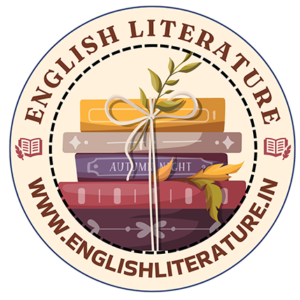There are a list of major authors in English Literature
1. Old English (Anglo-Saxon) Period (450–1066)
- Author: Unknown
- Major Work: Beowulf
- The Venerable Bede
- Ecclesiastical History of the English People
- Unknown Authors (composed orally)
- The Seafarer, The Wanderer
- Cynewulf
- Religious poetry like The Dream of the Rood
Context: The literature of this period was heavily influenced by Norse mythology and pagan traditions, later blending with Christian elements.
2. Middle English Period (1066–1500)
- Geoffrey Chaucer
- The Canterbury Tales, Troilus and Criseyde
- William Langland
- Piers Plowman
- Sir Thomas Malory
- Le Morte d’Arthur
- The Pearl Poet (Unknown Author)
- Sir Gawain and the Green Knight, Pearl
Context: This period saw the gradual development of the English language from Old to Middle English. It also marks the emergence of chivalric romances and religious allegories.
3. The Renaissance (1500–1660)
- William Shakespeare
- Hamlet, Macbeth, Romeo and Juliet, The Tempest, Othello
- Christopher Marlowe
- Doctor Faustus, The Jew of Malta
- Edmund Spenser
- The Faerie Queene
- John Milton
- Paradise Lost, Paradise Regained
- Sir Philip Sidney
- Astrophil and Stella, The Countess of Pembroke’s Arcadia
- Ben Jonson
- Volpone, The Alchemist
Context: The Renaissance was a time of rebirth for classical ideals, fostering a flourishing of drama, poetry, and prose. The introduction of the printing press helped spread these works more widely.
4. The Neoclassical Period (1660–1798)
- John Dryden
- Absalom and Achitophel, Mac Flecknoe
- Alexander Pope
- The Rape of the Lock, The Dunciad, Essay on Man
- Jonathan Swift
- Gulliver’s Travels, A Modest Proposal
- Samuel Johnson
- A Dictionary of the English Language, The Lives of the Poets
- Daniel Defoe
- Robinson Crusoe, Moll Flanders
- Henry Fielding
- Tom Jones, Joseph Andrews
Context: The Neoclassical period emphasized order, logic, and decorum. Writers drew heavily on classical forms, focusing on satire, essays, and heroic couplets.
5. The Romantic Period (1798–1837)
- William Wordsworth
- Lyrical Ballads, The Prelude
- Samuel Taylor Coleridge
- The Rime of the Ancient Mariner, Kubla Khan
- Lord Byron
- Don Juan, Childe Harold’s Pilgrimage
- Percy Bysshe Shelley
- Ozymandias, Prometheus Unbound
- John Keats
- Ode to a Nightingale, To Autumn
- Mary Shelley
- Frankenstein
- William Blake
- Songs of Innocence and of Experience, The Marriage of Heaven and Hell
Context: The Romantic period was marked by a focus on emotion, nature, and the individual. It reacted against the industrial revolution and the Enlightenment’s emphasis on reason.
6. The Victorian Period (1837–1901)
- Charles Dickens
- Great Expectations, A Tale of Two Cities, Oliver Twist
- George Eliot (Mary Ann Evans)
- Middlemarch, Silas Marner
- Thomas Hardy
- Tess of the d’Urbervilles, Far from the Madding Crowd
- Alfred Lord Tennyson
- In Memoriam A.H.H., The Charge of the Light Brigade
- Robert Browning
- My Last Duchess, The Ring and the Book
- Emily Brontë
- Wuthering Heights
- Charlotte Brontë
- Jane Eyre
- Elizabeth Barrett Browning
- Sonnets from the Portuguese
- Lewis Carroll
- Alice’s Adventures in Wonderland
Context: Victorian literature reflected the complexities of social, political, and technological change during the era, often focusing on social issues, realism, and moral questions.
7. The Modern Period (1901–1945)
- T.S. Eliot
- The Waste Land, Four Quartets
- Virginia Woolf
- Mrs Dalloway, To the Lighthouse, Orlando
- James Joyce
- Ulysses, A Portrait of the Artist as a Young Man
- D.H. Lawrence
- Sons and Lovers, Lady Chatterley’s Lover
- W.B. Yeats
- The Second Coming, Sailing to Byzantium
- F. Scott Fitzgerald
- The Great Gatsby
- Ernest Hemingway
- The Old Man and the Sea, A Farewell to Arms
- Katherine Mansfield
- The Garden Party, Bliss
Context: Modernism brought radical experimentation with narrative techniques, fragmentation, and a focus on the subconscious. The period was shaped by World War I and the interwar years.
8. The Postmodern Period (1945–Present)
- George Orwell
- 1984, Animal Farm
- Samuel Beckett
- Waiting for Godot, Endgame
- Salman Rushdie
- Midnight’s Children, The Satanic Verses
- Margaret Atwood
- The Handmaid’s Tale, Oryx and Crake
- Toni Morrison
- Beloved, Song of Solomon
- Haruki Murakami
- Kafka on the Shore, Norwegian Wood
- Kazuo Ishiguro
- Never Let Me Go, The Remains of the Day
- Don DeLillo
- White Noise, Underworld
Context: Postmodern literature often questions the nature of reality, truth, and identity. It features metafiction, pastiche, and a blending of high and low culture.
This list covers prominent authors across major periods in English Literature.
